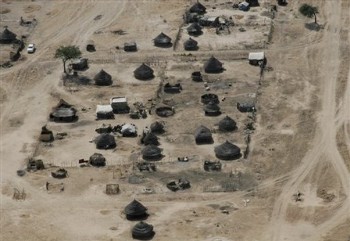S. Sudan rejects forming joint administration in Abyei with Sudan
May 11, 2013 (JUBA/KHARTOUM) – South Sudan has rejected forming a joint administration with the Sudanese government in the contested border region of Abyei, accusing Khartoum of having “killed the spirit of dialogue with [the] assassination of the area’s paramount chief, Kuol Deng Kuol”.
 South Sudan’s minister of cabinet affairs, Deng Alor Kuol, said on Saturday “the entire Ngok Dinka chiefdom” had totally rejected the proposal which calls for the formation of a joint administration in the area with representatives from Sudan.
South Sudan’s minister of cabinet affairs, Deng Alor Kuol, said on Saturday “the entire Ngok Dinka chiefdom” had totally rejected the proposal which calls for the formation of a joint administration in the area with representatives from Sudan.
Alor, a native of the oil-producing region of Abyei, made the comments at a news conference in Juba following a visit to the area where he spent nearly a week after leading a high-level government delegation from South Sudan to attend the burial of the tribal chief.
He accused Sudan of intentionally killing the chief, adding that the people of Abyei do not see any reason why they should share the area with those who conspired in his death.
“We are totally convinced that the chief was killed by the government of Sudan. They just used the [rival] Misseriya [tribe] as a tool because it is their culture”, Alor told reporters at the press briefing.
“The Ngok people have therefore rejected forming [a] joint administration. They do not want to share the area anymore with members of the Misseriya because it was the government of Sudan and their militia from the Misseriya that killed the paramount chief”, he added.
In statements published in Khartoum on Saturday, the Misseriya’s paramount chief, Mukhtar Babo Nimir, reiterated the need for the formation of an Abyei administration, stressing that such a measure would contribute to ending current tensions in the disputed area.
Nimir said that the lack of a local administration and legislative council had created a vacuum in the region, adding that the UN Interim Security Force for Abyei (UNISFA) was not aware of local customs and traditions.
Previous efforts by the two sides to form an interim administration in Abyei failed due to differences over the composition of the legislative council, with the Misseriya demanding 50% of the 20 seats, while the Dinka Ngok said it wanted 12 members as was the case in the past.
END OF ENGAGEMENT
Deng Mading Mijak, the deputy co-chairperson of the Abyei Joint Oversight Committee (AJOC) representing South Sudan, said the killing of the chief essentially meant that the government of Sudan had killed all attempts to peacefully resolve the disagreement over the area.
Mijak was one of the leaders of a delegation from Juba that was caught up in the attack, which left Kuol dead.
The group was visiting the area for consultative talks with a delegation from Khartoum on how to hasten the process of forming a joint administration to facilitate the return of displaced persons and prepare for a planned October referendum. He survived the incident on 4 April, describing it as a carefully planned attack by Sudan rather than an ambush.
“People say we were ambushed. It was not an ambush. It was a clear ploy by the government of Sudan. We were held for five hours during which we were online communicating with authorities in Khartoum. They knew we were caught. They were the ones directing every single move. The people who killed the chief did not know him. They even asked [who he was]. This means that it was a clear ploy by the government of Sudan”, Mijak said at a news conference on Saturday.
The official stressed that the death of the paramount chief meant the end of any engagement with Sudan.
“I don’t think it will be possible to come together again. The killing of the paramount chief means that they have killed peaceful coexistence. It means that they have killed joint administration. It means that they have killed the Abyei Joint Oversight Committee, because I do not think we will meet again in Abyei to discuss anything”, Mijak added.
NO GOOD REASON
Juac Agok, the deputy chairperson of the ruling Sudan People’s Liberation Movement (SPLM) in Abyei, said there had never been a good reason to form a joint administration with Sudan.
“If the international community want the issue of Abyei to be resolved, they should support the conduct of the referendum so that people of Abyei can vote to decide where they want to go”, Agok said.
“To form joint administration so that the same elements who have always been masterminding the killing of our people come back to the area again and share with us is not acceptable. It is better we leave it just like that; it can be never be resolved through dialogue”, he added.
A referendum initially scheduled for January 2011 to decide the fate of the Abyei area failed to take place over disagreements between the two countries about who was eligible to participate in the vote.
In a bid to break the deadlock, the African Union (AU) last year, proposed that the plebiscite go ahead, but only for those permanently residing in the area. The decision effectively excludes the nomadic Arab Misseriya, who enter the area periodically during the year to graze their cattle, from participating, leaving the Southern-aligned Dinka Ngok free to vote in favour of joining South Sudan.
Khartoum has rejected the plan, but AU mediators stress the exclusion of the Misseriya nomads is consistent with the decision of the International Court of Arbitration in July 2009, which defined Abyei’s territory as the nine Ngok Dinka chiefdoms.
(ST)
